
Are you scoring in the 600-750 range on SAT Math? Do you want to raise that score as high as possible—to a perfect 800?
Getting to an 800 SAT Math score isn't easy. It'll require perfection. But with hard work and my strategies below, you'll be able to do it. I've scored 800 on Math on all my SATs, and I know what it takes. Follow my advice, and you'll get a perfect score—or get very close.
Brief note: This article is suited for students already scoring a 600 on SAT math or above. If you're below this range, my "How to improve your SAT Math score" article is more appropriate for you. Follow the advice in that article, then come back to this one when you've reached a 600.
Why This Is the Best SAT Math Perfect Score Guide
A lot of SAT Math guides out there are pretty bad. They're written by people who don't have actual expertise in the test, or they contain vague advice that isn't helpful to the advanced student. You need better advice than simple SAT Math tips like "remember there's no guessing penalty!"
In contrast, I've written what I believe to be the best guide on getting an 800 available anywhere. I have confidence that these strategies work because I used them myself to score 800 on SAT Math, every time I've taken the SAT. They've also worked for thousands of my students at PrepScholar.
In this article, I'm going to discuss why scoring an 800 is a good idea, what it takes to score an 800, and then go into the 8 key SAT Math strategies so you know how to get an 800 on SAT Math.
Stick with me—as an advanced student, you probably already know that scoring high is good. But it's important to know why an 800 Math score is useful, since this will fuel your motivation to get a high score.
Finally, in this guide, I talk mainly about getting to a 800. But if your goal is a 700, these strategies still equally apply.
Understand the Stakes: Why an 800 SAT Math?
Let's make something clear: for all intents and purposes, a 1540+ on an SAT is equivalent to a perfect 1600. No top college is going to give you more credit for a 1580 than a 1550. You've already crossed their score threshold, and whether you get in now depends on the rest of your application.
So if you're already scoring a 1540, don't waste your time studying trying to get a 1600. You're already set for the top colleges, and it's time to work on the rest of your application.
But if you're scoring a 1520 or below AND you want to go to a top 10 college, it's worth your time to push your score up to a 1530 or above. There's a big difference between a 1440 and a 1540, largely because it's easy to get a 1440 (and a lot more applicants do) and a lot harder to get a 1540.
A 1520 places you right around average at Harvard and Princeton, and being average is bad in terms of admissions, since the admissions rate is typically below 10%.
So why get an 800 on SAT Math? Because it helps you compensate for weaknesses in other sections. By and large, schools consider your composite score more than your individual section scores. If you can get an 800 in SAT Math, that means you only need a 730 in SAT Reading and Writing. This gives you a lot more flexibility.
There are two other scenarios where an 800 in SAT Math is really important. First is if you're planning for a quantitative or science major (like math, physics, statistics, chemistry). The second is if you're applying to a highly selective technical school like MIT. (CalTech is the exception to this rule, as it is currently test-blind.)
Here's the reason: college admissions is all about comparisons between applicants. The school wants to admit the best, and you're competing with other people in the same "bucket" as you.
By applying as a math/science major, you're competing against other math/science folks: people for whom SAT Math is easy. Really easy.
Here are a few examples from schools. For Harvard, Princeton, MIT, and even less selective schools like Carnegie Mellon, the 75th percentile SAT Math score is an 800. That means at least 25% of all students at these schools have an 800 in SAT Math.
Even more surprising: the 25th percentile score for SAT Math at MIT is 780. This means if you score a 750 on your SAT Math, you're well below average for this type of school!
I'm not going to lie. SAT Math was super easy for me. I got 800 on pretty much every practice test and official SAT I ever took. You're competing against people like me. And if you apply with a 700 on Math, schools like MIT, Harvard, and Princeton are going to doubt your ability. Because SAT Math is supposed to be trivially easy for you.
But if you can work your way to an 800, you show that you're at an equal level (at least on this metric). Even if it takes you a ton of work, all that matters is the score you achieve at the end.

Know That You Can Do It
This isn't just some fuzzy feel-good message you see on the back of a Starbucks cup.
I mean, literally, you and every other truly motivated student can score an 800 on SAT Math.
More than anything else, your SAT score is a reflection of how hard you work and how smartly you study.
Here's why: the SAT is a weird test. When you take it, don't you get the sense that the questions are nothing like what you've seen in school?
It's purposely designed this way. The SAT can't test difficult concepts, because this would be unfair for students who never took AP Calculus. It can't ask you to solve Fermat's Last Theorem. The SAT is a national test, which means it needs a level playing field for all students around the country.
So it has to test concepts that all high school students will cover. Basic algebra (solving single-variable equations, word problems), advanced algebra (quadratic and exponential equations), geometry (x-y coordinate geometry, circles squares and triangles), and basic statistics.
But the College Board still has to make the test difficult to differentiate student skill levels, so the SAT needs to test these concepts in strange ways. This trips up students who don't prepare, but it rewards students who understand the test well.
Here's an example:
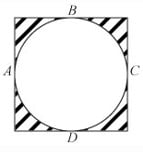
This is a classic SAT type question. You might already know how to solve it. But it's unlikely you ever ran into something like this in school.
The first time you see this, it might be confusing. How do you get the area of each of the shaded corners? It kind of looks like a triangle, but not really because of the curve region.
But you've learned all the concepts you need to solve this.
Notice that the shaded area is the area of the square, with the area of the circle punched out. To get to the answer quickly, this means that the area of a square is 10 x 10 = 100, and the area of a circle is πr2, or π * 5 * 5 = 25π.
So the area of the shaded region is 100—25π.
The SAT math section is full of weird examples like this, some of which get much more difficult.
To improve your score, you need to:
- master the types of questions that the SAT tests, like the one above
- draw on the correct concepts you already know to solve the questions
- practice on a lot of questions so you learn from your mistakes
I'll go into more detail about exactly how to do this. First, let's see how many questions you need to get right an 800.
What It Takes to Get An 800 in Math
If we have a target score in mind, it helps to understand what you need to get that score on the actual test, and in the past, we could calculate fairly precisely how many questions you needed to get right in order to get a perfect score. Unfortunately, the new adaptive format makes those calculations irrelevant. For now, we have to assume you cannot miss any questions if you want a perfect score on the digital SAT.
The safest thing to do is to aim for perfection. You need to try to get every question right.
Strategies to Get an 800 on SAT Math
OK—so we've covered why scoring a higher SAT math score is important, why you specifically are capable of improving your score, and the raw score you need to get to your target.
Now we'll get into actionable strategies that you should use in your own studying to maximize your score improvement:
- Understand Your High-Level Weakness
- Analyze Your Mistakes
- Fill Content Gaps
- Retry Questions BEFORE Reading the Explanation
- Master Every SAT Math Skill
- Save Time to Double Check Your Answers
- Eliminate Careless Mistakes
- Memorize the Formulas
- Know When to Use the Calculator
- Keep Calm

Strategy 1: Understand Your High Level Weakness
Every student has different flaws in SAT Math. Some people aren't comfortable with the underlying math material. Others know the math material well, but can't solve questions quickly enough or get distracted in the stressful testing conditions.
There are two main types of high-level weakness: content and time management. Students with content weaknesses don't understand some of the concepts covered on SAT Math, while those with time management weaknesses wither struggle to finish the test or make careless errors due to rushing through questions.
After taking your first practice test (from the complete list of free practice tests), you'll need to analyze the questions you missed and dig into why you got them wrong (more on this below). As you do that, also look for high-level patterns by asking the following questions:
- Did you run out of time on the math module? If not, did you use extra time to double check your answers? Not finishing the test is typically an indicator of time management problems, but even finishing every question doesn't necessarily mean you used all the time effectively.
- Look at the questions you spent the most time on, whether you answered them correctly or not. Why did they take you so long? Was there a faster way to solve it?
- For questions that tripped you up (even if you ended up getting the right answer), was the issue that you didn't know the underlying math or that you struggled to make sense of the question?
- Did you miss any questions that you are confident you know how to solve? Did you miss it because you were rushing through the question?
Typically I see that students have both timing and content issues, but you might find that one is much more dominant for you than the other.

Strategy 2: Do a Ton of Practice, and Analyze Every Single Mistake
On the path to perfection, you need to make sure every single one of your weak points is covered. Even one mistake on all of SAT Math will knock you down from an 800.
The first step is simply to do a ton of practice. If you're studying from free materials or from books, you have access to a lot of practice questions in bulk. As part of our PrepScholar program, we have over 7,000 SAT questions customized to each skill.
The second step—and the more important part—is to be ruthless about understanding your mistakes.
Every mistake you make on a test happens for a reason. If you don't understand exactly why you missed that question, you will make that mistake over and over again.
I've seen students who did 20 practice tests. They've solved over 3,000 questions, but they're still nowhere near an 800 on SAT Math.
Why? They never understood their mistakes. They just hit their heads against the wall over and over again.
Think of yourself as an exterminator, and your mistakes are cockroaches. You need to eliminate every single one—and find the source of each one—or else the restaurant you work for will be shut down.
Here's what you need to do:
- On every practice test or question set that you take, mark every question that you're even 20% unsure about.
- When you grade your test or quiz, review EVERY single question that you marked AND every incorrect question. This way even if you guessed a question correctly, you'll make sure to review it.
- Keep a log of these problematic questions where you write down:
#1: the gist of the question
#2: why you missed it, and
#3: what you'll do to avoid that mistake in the future.
Have separate sections by subject and sub-topic (algebra—solving equations, data analysis—experimental interpretation, etc.)
It's not enough to just think about it and move on. It's not enough to just read the answer explanation. You have to think hard about why you specifically failed on this question.
By taking this structured approach to your mistakes, you'll now have a running log of every question you missed, and your reflection on why.
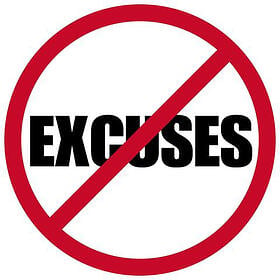
No excuses when it comes to your mistakes.
Always Go Deeper—WHY Did You Miss a SAT Math Question?
Now, what are some common reasons that you missed a question? Don't just say, "I didn't get this question right." That's a cop out.
Always take it one step further—what specifically did you miss, and what do you have to improve in the future?
Here are some examples of common reasons you miss a question, and how you take the analysis one step further:
Content: I didn't learn the math skill or knowledge needed to answer this question.
One step further: What specific math skill do I need to learn, and how will I learn this skill?
Incorrect Approach: I knew the content, but I didn't know how to approach this question.
One step further: How do I solve the question? How will I solve questions like this in the future?
Careless Error: I misread what the question was asking for or solved for the wrong thing.
One step further: Why did I misread the question? What should I do in the future to avoid this?
Get the idea? You're really digging into understanding why you're missing questions.
Yes, this is hard, and it's draining, and it takes work. That's why most students who study ineffectively don't improve.
But you're different. Just by reading this guide, you're already proving that you care more than other students. And if you apply these principles and analyze your mistakes, you'll improve more than other students too.
Strategy 3: If You Have Math Content Gaps, Be Ruthless About Filling Them
Within SAT Math, you have to master a lot of subjects. At the high level, you need to know basic algebra, advanced algebra, data analysis, and geometry. Even further, within algebra, you need to know how to solve equations, how to deal with word problems, properties of functions, etc.
Here's our complete mapping of all 24 skills you need in SAT Math:
- Basic Algebra
- Linear functions
- Single variable equations
- Systems of linear equations
- Absolute value
- Advanced Algebra
- Manipulating polynomials
- Quadratic equations
- Dividing polynomials
- Exponential functions
- Function notation
- Solving exponential equations
- Systems of equations with nonlinear equations
- Problem Solving and Data Analysis
- Ratios and proportions
- Scatterplots and graphs
- Categorical data and probabilities
- Experimental interpretation
- Mean, median, mode, standard deviation
- Additional Topics
- Coordinate geometry—lines and slopes
- Coordinate geometry—nonlinear functions
- Geometry—circles
- Geometry—lines and angles
- Geometry—solid geometry
- Geometry—triangles and polygons
- Trigonometry
- Complex numbers
This might be a more detailed breakdown of skills then you're used to, but at PrepScholar we believe in grouping questions by specific skill so you can train most effectively. Unless you're a math whiz and are already scoring a 750-800, it's unlikely that you've mastered all of these evenly. You probably have different strengths and weaknesses across these subjects.
If you find that you have a content problem from the practice test analysis, you need to make improve your understanding of that subject a priority in your prep.
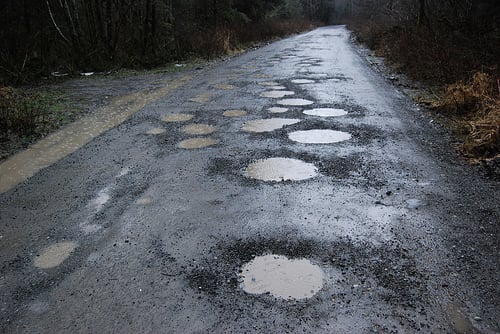
Fill in the potholes of your understanding.
Think of a making a content mistake like discovering a cavity in your mouth. When your dentist fills in a cavity, he doesn't just patch up the hole right away. He cleans out the entire cavity, sterilizes it, then adds a filling.
Content mistakes are similar—you have a weakness in a subject, say x-y coordinate geometry. This probably means you have a lot of other weaknesses in that subject other than the one identified by that question. Don't just focus on understanding that one question you missed.
Take the opportunity to research that subject and get more practice in it. Review (or teach yourself!) the key concepts that are tripping you up and find more practice questions for this skill (even if they aren't SAT questions) to drill your mistakes.
In our SAT prep program PrepScholar, we do all of this work for you by splitting up our 7,000+ practice questions by skill and difficulty. If you're weak in solving algebraic equations, you get 20+ questions in a quiz dealing specifically with that skill. This repetitive practice fills up any content gaps far better than any other method I know.
Strategy 4: If You Miss a Question, Try It Again Before Reading the Explanation
When you miss practice questions, the first thing you do is probably to read the answer explanation and maybe reflect on it a little.
That's too easy—you're not actively engaging with the mistake you made. You won't actually learn from your mistake, and you'll make that mistake over and over again.
Instead, check the correct answer choice (A-D) without looking at the explanation and try to re-solve the question once again to get the correct answer.
Doing so will often be hard. You couldn't solve it the first time, so why could you solve it the second time around? But with less time pressure, you might spot a new strategy or see the mistake you made.
Treat each wrong question like a puzzle. Struggle with each wrong answer for up to 10 minutes. Only then if you don't get it should you read the answer explanation.
When this happens, what you learned will stick with you for 20 times longer than if you just read an answer explanation. I know from personal experience that when you've struggled with a concept and reached a breakthrough, you retain that information far better than if you just passively absorbed the information.

Strategy 5: Master Every SAT Math Skill—Even the Rare Ones
The SAT has an uneven balance of questions by skill. Algebra dominates the test, taking up over 50% of the test. This is somewhat good news, in that if you're an Algebra whiz, you'll do well on the bulk of SAT math.
The bad news is that there's a long tail of straggling skills that only show up occasionally. We've done a careful analysis of every math question on every official SAT test, and here are the least common skills in SAT math.
| Skill | Frequency | Expected Questions Per Test |
| Dividing polynomials | 1.72% | 1 |
| Trigonometry, radians | 1.72% | 1 |
| Absolute value | 1.29% | 0.75 |
| Complex numbers | 1.29% | 0.75 |
| Experimental interpretation | 0.86% | 0.5 |
| Lines and angles | 0.86% | 0.5 |
| Solid geometry | 0.86% | 0.5 |
| Systems of equations with nonlinear equations | 0.86% | 0.5 |
| Function notation | 0.43% | 0.25 |
It might surprise you that some of these skills have an expected number of questions lower than one. But even though you might not even get a complex number or solid geometry question, you have to know it anyway. You have to know it all.
This is the challenge of the 800 Math scorer—you need a wide BREADTH of knowledge as well as DEPTH of mastery in each one. No single test is going to test the entire breadth of your knowledge, but you must be prepared anyway because you can't predict what they're going to test.
The way we handle this at PrepScholar, which is based on how I mastered the SAT myself, is to give you detailed lessons and quizzes for all 24 Math skills, and all Reading/Writing skills. For even the least common skills like complex numbers and solid geometry, you'll get dozens of questions to practice with and master the skill. You'll leave no stone unturned, which is why top scoring students love us.
If you don't use PrepScholar, then you need to find great sources of practice content yourself, and to structure your study time optimally so you get both breadth and depth.
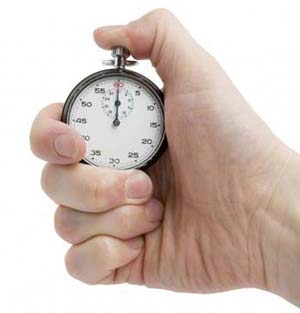
Strategy 6: Finish With Extra Time and Double Check
Ultimately, your goal is to get so good at SAT Math that you can solve every question and have extra time left over at the end of the section to recheck your work.
In high school and even now, I can finish SAT Math sections in about 60% of the time allotted. This means I finish a 25 minute section in 15 minutes or less, and a 55 minute section in 35 minutes. This gives me a ton of time to recheck my answers two times over and make sure I make no careless mistakes.
How can I finish a section this quickly? It comes down to mastery of the math skills and a LOT of experience with the test. When I see a question, I usually know exactly what the College Board is asking for, and I've seen so many such questions that I know exactly how to solve it in the fewest steps needed.
And if you're pretty far from this time benchmark, don't fret—it took me a lot of training and experience to get to this level. (After all, I've seen thousands of questions in my own SAT prep and when designing our PrepScholar SAT program).
So let's say you finish a section ahead of time. What do you do with all that extra time?
Don't rest and don't put your head down. Use this valuable time to double-check, even triple-check your work. Remember, even one question missed will bring you down from an 800—you need to achieve perfection.
What's the best way to double-check your work? I have a reliable method that I follow:
- Re-read the question again. Question your assumption about what the question is about. If the question asks for a specific variable, make sure you're solving for that variable!
- Try to resolve the question with a different method than the one you originally used. If I solved a question algebraically, I can recheck it by plugging in the solution.
- If I'm not 100% sure I'm right on a question, even if it's just a little twinge of remaining doubt, I'll mark it for review and come back to it on the third pass.
Here's an example of solving a question two ways:

First way: My natural instinct is to solve this algebraically. I know I can plug in numbers, but I feel that's slower and more error prone than getting a definitive answer through solving the equation.
3x - 5 ≥ 4x - 3
I can rearrange in my head in one step like so:
-2 ≥ x
(if you make careless mistakes, like the College Board expects you to do, it's worthwhile splitting it up into smaller steps)
OK, so the solution set is numbers less than or equal to -2. This leaves answer A as NOT the solution.
Double-check way: Now that I know answer A should be correct, I'm going to verify by plugging that value back in and expecting the inequality to fail:
3x - 5 ≥ 4x - 3
-3 - 5 ≥ -4 -3
-8 ≥ -7
That's obviously false, so I can verify that A is the right answer. At this point I'm confident enough that I can move on and not check this question again.
Another time management tip: If you notice yourself spending more than 30 seconds on a problem and aren't clear how you'll get to the answer, skip and go to the next question. Even though you need to get every question right to guarantee an 800, don't be afraid to skip. You can come back to it later, and on your first pass it's more important to get as many points as possible.

Strategy 7: Eliminate Careless Mistakes
Careless mistakes are one of the most frustrating types of errors to make, and nearly everyone makes them, especially on SAT Math.
You know the underlying material, you know how to solve the question, and you're feeling good. But then you grade the quiz, and you find a careless mistake: it turns out the question asked for the perimeter of the circle and not the area, which is what you calculated.
These types of errors are the most costly and frustrating. You've already put in a ton of work to master the underlying material, and here a question has tricked you into losing a point.
This is why finishing the test early, like I mention above, is so helpful. You get extra time to take a breather and double-check your answers.
If you find that careless mistakes are a recurring problem for you, here are some strategies to get rid of them:
- In each question, highlight what the question is specifically asking you to solve for. It's so easy for the SAT to trick you into solving the wrong thing.
- If you're solving for a particular value (like length, area, etc), write the units down on your scratch paper or add an annotation.
- Be careful with calculator entry. A missing parentheses makes a big difference. "4 + 9 / 2" is completely different from "(4 + 9) / 2"
Here's an example:
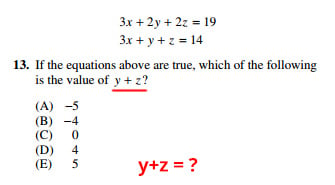
This question is asking us to solve for y + z. Not x, y, or any other combination of variables.
To make sure I remember this, I underline y + z, and I also write "y + z = ?" in the work space so that I remember what I'm solving for.
You can bet that in many answer choices, the SAT will have trap answers for other things you can solve for, like x. (This one happens not to, but it's very common).
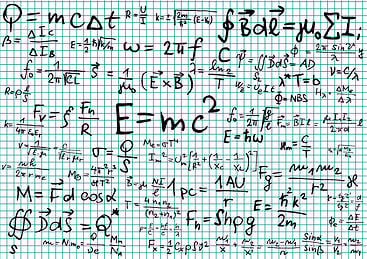
Memorize the SAT Math Formulas.
Strategy 8: Memorize the Formulas and Common Math Facts
If you're still relying on the pop-up math formulas, you haven't gotten to understand SAT Math well enough yet. Not only does checking these cost you time, it also indicates that you haven't practiced enough with SAT Math to make using these formulas second nature.
Memorizing common math facts, including the formulas in the reference, is key to improving your speed on the SAT Math. These are some additional math facts I recommend you know:
- Calculating slope from two points (rise over run)
- Remainder when dividing a polynomial
- Common right triangles:
- By angles
- 45-45-90 (1-1-√2)
- 30-60-90 (1-√3-2)
- By sides
- 3-4-5
- 5-12-13
- By angles
- Formula for volumes, surface areas
We have a complete list of SAT Math formulas here.
Strategy 9: Know When to Use the Calculator
The digital SAT's built-in Desmos calculator is a powerful tool for the test. You can use it to perform complex arithmetic, quickly complete multi-step calculations, and even graph systems of equations.
However, not every question requires this tool. Learning to solve questions without the use of a calculator will strengthen your math intuition and force you to understand the underlying math, rather than relying on a calculator.
In fact, solving without a calculator is actually faster in many cases. Here's an example:

The calculator way to solve this would be to solve for the quadratic formula, 0 = -4.9 t2 + 25t. You can plug it in and the calculator will spit out two values for t.
How I would naturally approach is to factor first:
0 = t (-4.9t + 25)
Obviously t = 0 is one solution, but the other solution is pretty easy to find too. I don't even need to use the calculator—I know 4.9 is close to 5, so I can see that t is close to 5. This is answer D.
For me, the second way is faster and feels more robust than the first. I know I've solved for t definitively, and I'm confident in my answer choice. Whereas if I used a calculator, I don't have a "feel" for the solution—I'm purely trusting the calculator and what I entered into the calculator as correct.
Now, when I double-check (Strategy 6), I might solve it a different way by plugging in the answer choices. I'll try plugging in answer choices C and D, and it'll be clear that D is the better answer. But this is reserved for answer checking, rather than the first time I solve it.
Being able to solve SAT Math questions without a calculator will train your SAT Math skills more rigorously. This is important when you're aiming for a perfect math score.

Strategy 10: Keep a Calm Mind During the Test, No Matter What
Now you know what it takes to achieve perfection on SAT Math.
You know that it's critical to get every single question right — missing even one can drop your score to 780.
This pressure makes a lot of students freak out during the test: "I can't solve this question...my 800 is gone...I'm getting more nervous and I have to skip the next question too..."
You can see how quickly you can unravel. Before you know it, you're scoring way worse than you ever did on a practice test.
You need to learn to be mentally strong, like an athlete on game day.
Yes, you might have to skip a question on the first pass through. Maybe even two in a row.
But you've practiced hard up to this point. You know this stuff, and you'll come back to those questions and get it later.
You need to keep up a positive mindset during the test, or you'll crumble.
And in the worst case, maybe you won't get an 800. But if you've consistently been getting 800's on the practice tests, you likely won't go much lower than 750—and that's still really good.
Recap: How to Get a Perfect SAT Math Score
Those are the main strategies I have for you to improve your SAT math score to an 800. If you're scoring above a 600 right now, with hard work and smart studying, you can raise it to a perfect SAT Math score.
Notice that I didn't actually teach you that much math content. I didn't point to any specific math solutions that will instantly raise your score.
That's because these one-size-fits-all, guaranteed strategies don't really exist. (And anyone who tells you this is deceiving you). Every student is different.
Instead, you need to understand where you're falling short, and drill those weaknesses continuously. You also need to be thoughtful about your mistakes and leave no mistake ignored.
If you want to go back and review any strategies, here are quick links to them:
Strategy 1: Understand Your High Level Weakness
Strategy 2: Do a Ton of Practice, and Understand Every Single Mistake
Strategy 3: If You Have Math Content Gaps, Be Ruthless About Filling Them
Strategy 4: If You Miss a Question, Re-Solve It First
Strategy 5: Master Every SAT Math Skill—Even the Rare Ones
Strategy 6: Finish With Extra Time and Double Check
Strategy 7: Eliminate Careless Mistakes
Strategy 8: Memorize the Formulas and Common Math Facts
Strategy 9: Don't Overly Depend on the Calculator
Strategy 10: Keep a Calm Mind During the Test, No Matter What
Keep reading for more resources on how to boost your SAT score.
What's Next?
We have a lot more useful guides to raise your SAT score.
Read our complete guide to a perfect SAT score, written by me, a perfect scorer. I built the PrepScholar program based on the principles in this article—the principles that worked for me and thousands of our students.
Are you aiming for a top school like Harvard or the Ivy Leagues? Here's my famous guide on How to Get Into Harvard.













